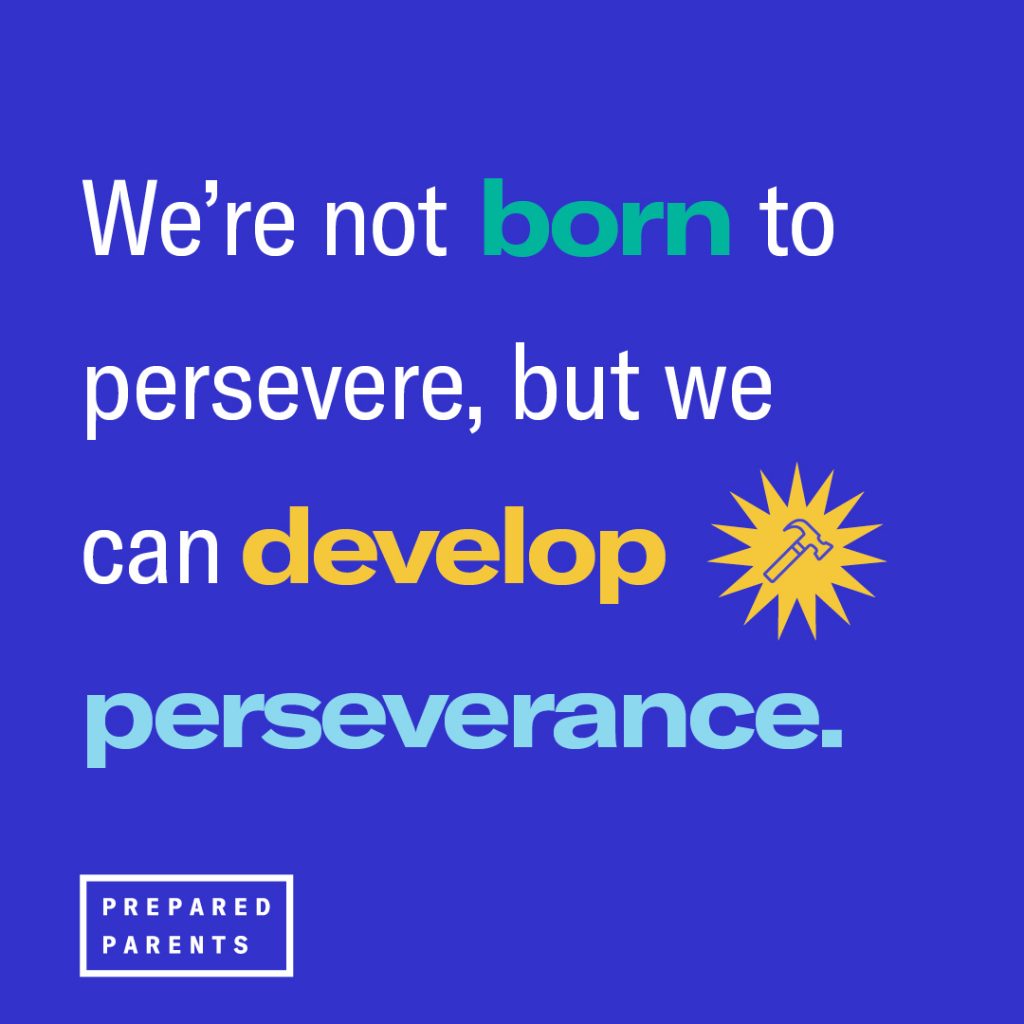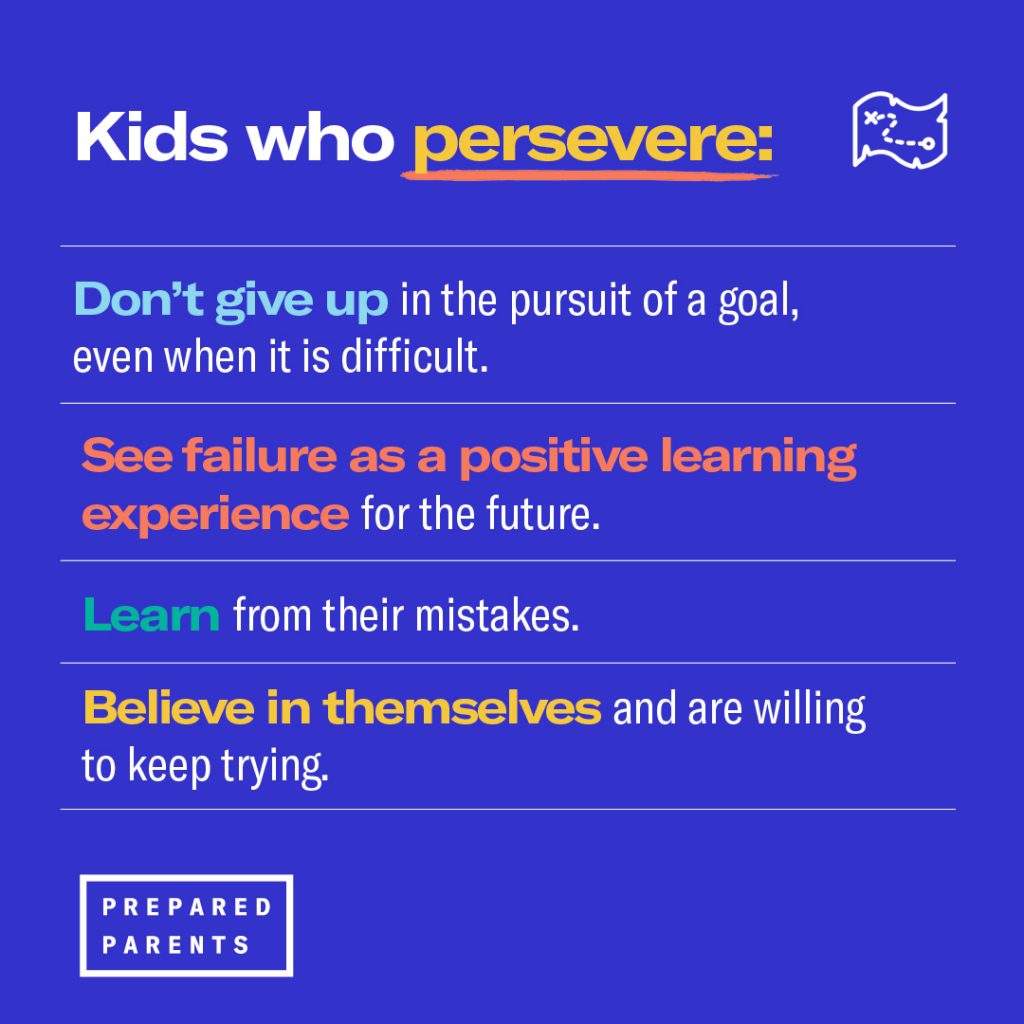We’re not born to persevere, but we can develop perseverance.

Perseverance includes habits and behaviors that help kids keep going when the going gets tough:
- Resilience—learning how to bounce back from setbacks and dealing with challenging situations;
- Agency—learning to make your own decisions and act on them; and
- Academic tenacity—overcoming distractions and working toward longer term goals.
Kids who persevere refuse to give up in the pursuit of a goal, even when it’s difficult. They see failure as a positive learning experience they can use in future endeavors. They choose to learn from their mistakes and don’t make excuses or blame others for failure. Perseverant kids believe in themselves and are willing to keep trying.
Neuroscientists have determined that dopamine is the fuel within our brains that motivates us to persevere and achieve a goal. It functions as a neurotransmitter that floods our bodies and minds with a rush of satisfaction and reward anytime we succeed at achieving something biologically necessary for our survival. Dopamine can be harnessed and used as a prime motivating force to help us keep pushing to achieve goals. When its levels are boosted, our confidence increases and we feel good, which ignites a virtuous cycle because we want to continue to feel good about what we accomplish.

In her 2012 report, Teaching Adolescents to Become Learners, researcher Camille A. Farrington said that a student’s attitudes and self-perceptions make them persevere in any given classroom on any given day. In other words, perseverance is situational. The kid who persists in solving a math problem may show no interest in completing a history assignment.
Farrington points to four core beliefs that impact how willing a student is to push through challenges to learn:
- I belong in this academic community.
- My ability and competence grow with my effort.
- I can succeed at this.
- This work has value to me.
Six Ways Kids Can Nurture Perseverance
- Give yourself a pep talk.
Set an intention to be positive. Avoid put-downs and say, “you can do this.” Imagine how you’d encourage a friend and be a friend to yourself. Remind yourself of past accomplishments as encouragement and get excited about all you’re going to learn. You might even give yourself a pat on the back, a high five, or a self-hug. - Dream about the obstacles.
How we deal with obstacles is a big part of our success or failure. To reach a big goal, we have to take obstacles into account and plan how to overcome them. Now’s the time to WOOP it up! Developed by psychologists Gabriele Oettingen and Peter M.Gollwitzer, WOOP is a science-based mental strategy anyone can use to fulfill their wishes. It’s been adapted for learning by the education research nonprofit, Character Lab.
W – Choose a Wish
O – Imagine the Outcome
O – Identify the Obstacle
P – Make a Plan - Tap into your confidence.
Confident kids believe in their ability to learn or perform new skills and behaviors based on what they already know. So, believe it to achieve it! - Banish fear.
Don’t be afraid of the challenge ahead. It may be a parent’s natural instinct to come to the rescue and banish our kid’s fear, but teaching them to manage it themselves helps them learn self-regulation and stress management. - Call in reinforcements.
When you’ve tried to solve a problem using several different methods and you’re truly stuck, it’s okay to ask for help. That’s one of the five power behaviors a kid can use to overcome a hurdle. When you push through something hard because you want to learn it, you’re reaching what learning scientists call ‘desirable difficulty.’ Power through it to retain the information longer and in greater detail. - Find a partner.
Work collaboratively with other motivated students to problem-solve. Learning this skill elevates each team member’s contribution and improves a project’s outcome.
Five Ways a Parent Can Help a Kid Develop Perseverance
- Recognize that the struggle is real.
But the struggle is good. Resist the temptation to micro-manage. Research tells us the impact on kids of a parent who is too controlling and micromanages results in ineffective coping skills, stress, depression, and a lower level of satisfaction with life. Instead support your kid’s efforts with I do, we do, you do to get them into the zone of proximal development, the sweet spot of learning. In the school setting, teachers use scaffolding to help kids get into the Zone. Parents can do the same by adding support and systematically building on the student’s experience and knowledge as they’re gaining new skills. Scaffolding challenges the student just enough that they learn new skills, but not enough that they get frustrated or give up. - Lead the cheer.
Praise their effort and celebrate the small wins. Known as the Progress Principle, small wins are baby steps forward that eventually lead to big accomplishments. Embedded in the science of how kids connect with what they are learning is intrinsic motivation. The feeling of making progress keeps kids motivated because it’s personally rewarding and they like doing it. - Marry perseverance to purpose.
Diane Tavenner, author of Prepared: What Kids Need for a Fulfilled Life and co-founder and CEO of Summit Public Schools says, “People with a sense of purpose know who they are. They know what their values are. They know what motivates them. They understand what society has to offer them, and they take advantage of opportunities to make choices that are aligned with who they are.” Purpose is at the heart of human motivation. When your kid finds purpose in the school work they do, they’re more likely to find value in it. - Accept failure.
Angela Duckworth, founder and CEO of Character Lab says, “We want [kids] to discover the magic of repetition, of slowing things down to focus on an area of improvement, and of failing, failing, failing, in order to succeed.” Failure equals opportunity in disguise. It’s a chance to persevere and work through a challenge; to get back up and try again. - Quit while you’re ahead.
There may be times when it’s better to quit, than to persevere. In fact one study determined that people who don’t quit often continue with worthless tasks that are both uninteresting and unrewarding and ultimately waste their time and talents. Assess the value of continuing with a task. If your plan isn’t working, it may be time to rethink the plan and go in a different direction.
The kid who develops perseverance is in it for the long run. They’ll gain stamina they can tap into for a lifetime.

